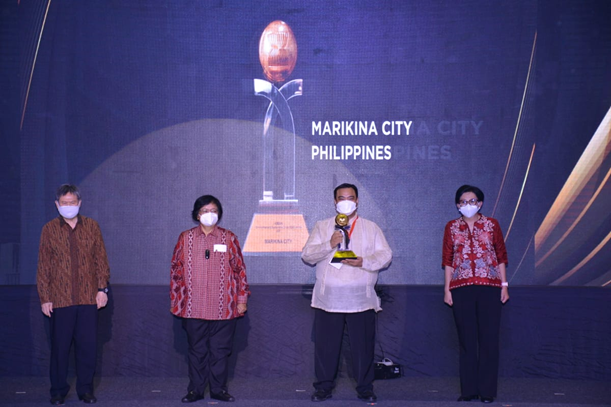JPM-Press Release-2021-39

Third Secretary Noel Rodriguez from the Permanent Mission of the Philippines to ASEAN receives the award on behalf of Marikina City. Also in the photo are (left to right) ASEAN Secretary-General Lim Jock Hoi, Indonesia’s Minister of Environment and Forestry Siti Nurbaya and Director General for Solid Waste Management, Rosa Vivien Ratnawati of Indonesia’s Ministry of Environment and Forestry.
21 October 2021- Marikina City was among the recipients of the prestigious ASEAN Environmentally Sustainable Cities Award during the 5th ASEAN Environmentally Sustainable Cities (ESC) and Certificates of Recognition (COR) Awarding Ceremony held at the Indonesia’s Ministry of Environment and Forestry in Jakarta on 21 October 2021.
The ASEAN ESC Award, held in conjunction with the 16th ASEAN Ministerial Meeting on the Environment (AMME), aims to recognize exemplary efforts to keep ASEAN cities clean, green, and livable. It was first held in 2008 and conducted every three years since then.
In his remarks, ASEAN Secretary-General Lim Jock Hoi said that the world faces two enormous challenges, namely the climate crisis and the COVID-19 pandemic. He added that due to the pandemic, the journey towards sustainability has become more challenging but the opportunities to build back better are even greater.
“Cities are on the frontline of climate crisis,” he said. “As such, it is crucial for governments to promote and support environmentally sustainable practices and build the resilience of its communities.”
According to Indonesia’s Minister of Environment and Forestry, Siti Nurbaya, the ASEAN ESC Award is one of the most effective approaches to encourage cities in ASEAN to mobilize their resources to build clean and green cities, and in turn, set standards for other cities to follow.
“I sincerely hope that it will motivate us to improve our environmental performance and inspire others to share best practices around the world. Therefore, I would like to reiterate that strong collaboration is the key to bridging the gap and to moving forward in a more harmonious way,” said Minister Siti.
The city of Marikina received the highest scores for all three categories on clean air, land, and water through the assessments conducted by the Philippines’ Department of Environment and Natural Resources. The city’s air quality is within the standards of the U.S. Environmental Protection Agency. The city also has a dedicated anti-smoke belching unit that conducts daily roadside inspections to check the emission level of motor vehicles, and which saw a dramatic 47 percent reduction in apprehended smoke belchers from 4,183 individuals in 2018 to 2,204 in 2019.
Regarding water management, 100 percent of Marikina’s households have access to water infrastructure provided by Manila Water, the city’s water concessionaire. The provided tap water also meets the drinking water standards of the World Health Organization (WHO) and fully meets the average consumption needs of local consumers. Moreover, more than 70 percent of the city’s households and industries are linked to two existing wastewater treatment facilities with combined capacity of 110 million L/day. Because of this, only one deep well for groundwater is extracted for use.
Marikina is likewise a pioneer in solid waste management in the Philippines. The city ensures the storage of all wastes in dedicated holding areas/receptacles before being properly disposed; 100 percent collection of household wastes through a door-to-door system; and 100 percent waste transportation via covered vehicles.
Marikina also scores high for green spaces. The city’s green spaces (515.61 ha) exceeds the required area needed (428.20 ha) for a healthy living based on WHO standards (9.5 m2 green space/capita).
Previous winners of the ESC award from the Philippines are Puerto Princesa in 2008 and 2011 and San Carlos City in 2014 and 2017.
Meanwhile, Parañaque City received a Certificate of Recognition under the category “Clean Land for Big Cities.” The city was cited for its solid waste management program which includes the strict implementation of segregation-at-source, segregated collection, and proper waste disposal. The city continues to improve its systems and processes not just to comply with existing laws but to ensure that its citizens have access to a healthy and safe environment.
Third Secretary Noel Rodriguez of the Permanent Mission of the Philippines to ASEAN received the awards on behalf of the two Philippine-based cities during the ceremony. (END)

